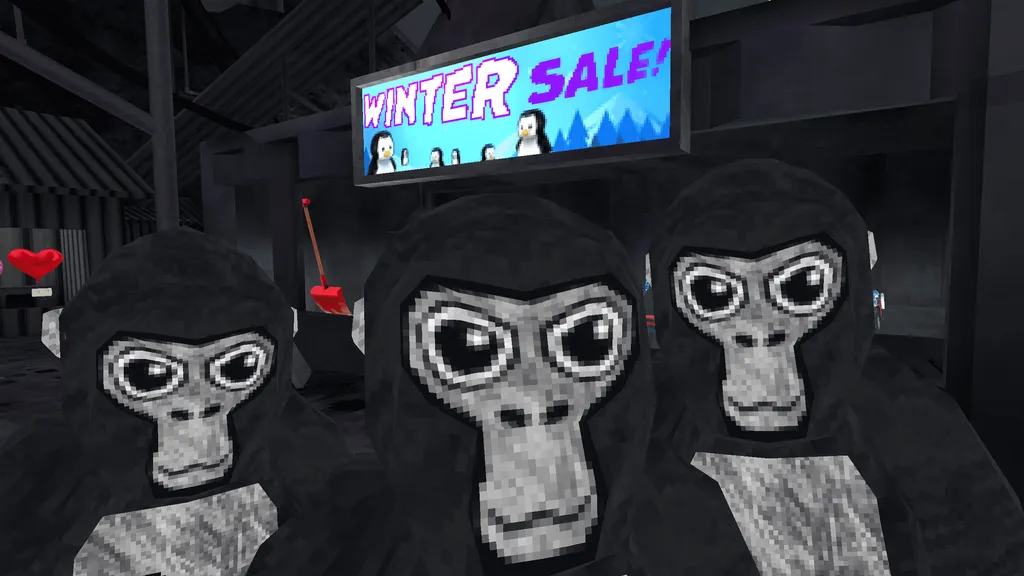Kerestell Smith says he's from New York, but he won't give more details because some Gorilla Tag players are "so passionate."
Players in Gorilla Tag swing their arms like monkeys to chase each other around the virtual playground, an idea Smith started piecing together just as physical playgrounds shut down during the COVID-19 pandemic.
"I started on the prototype that eventually became Gorilla Tag in December 2019," Smith told UploadVR during an interview at Meta Connect this year. "Then around January 2020 is when I first had some of the movement prototype working. Then it was a few months later when I had the idea of making a game of tag."
The title first hit Steam and SideQuest in 2021, added in-app purchases late that year, and then hit full release on Quest and PC VR headsets in December 2022. Since that time, Gorilla Tag has generated more than $100 million in revenue just from players monkeying around in VR. As Smith embarked onto this remarkable trajectory, in August 2022 he teamed up with David Yee (formerly Meta) and David Neubelt (formerly Ready At Dawn). Now, they envision a much grander future for VR sports than anything that's come before.
Orion Drift: Echoes In An Arena
Smith was a top-ranked Echo Arena player before Meta shut the game down.
As Another Axiom builds out its second title now in closed beta, Smith hasn't forgotten the specific sense of community he felt in that game as it came together around the zero-g launch tubes.
"Echo isn't completely the wrong word," Smith says of what they're building in Orion Drift.
Orion Drift's big idea is to put a series of versions of sports like soccer, volleyball, and golf, all based around "hand-based locomotion", set down in specific districts inside of an enormous space station with a capacity for 200 people. The idea is to blur the lines between spectator and athlete across this gigantic venue, with players creating ad-hoc teams and flowing freely between the different districts.
And, yes, there will be a zero-g district on this space station too.
"You're playing in an arena and there's an arena next to you, and then there's another one and another one, and people can go through these courts and see what different games are happening and another game starts and people go over there....and that's one district," Smith explained. "The DNA that spawned Gorilla Tag, that's working its way into our next games, it's not a specific set of interactions, it's not a specific game mode we're trying to replicate," Smith explained. "It's the experience of being in a place with other people. The connections you can form, the communities you can be a part of."
While Smith's team won't reveal details yet on exactly how close to Echo Arena they're getting with their zero-g district in Orion Drift, while we're meeting in the middle of Meta's headquarters, Smith's excitement for realizing this sprawling landscape overtakes him, and he has trouble stopping himself from talking.
"You start striking up a friendship, maybe one person invites the other, 'hey maybe you should join my team and maybe we'll compete. That's the experience I had that, in a flatscreen game, I never got, and I never sought out, but the game induced me to interact with the community in a way that I got a ton of value out...that was something that was very uniquely enabled by VR," Smith says.
"The comparisons people make when they talk about the things that are inconvenient about VR, right? Oh, it's this heavy thing you have to put on your head, you have to make sure it's charged...and you have the space for it and, man, compared to all of that, isn't it easier to just sit on your couch and play on your PlayStation or Xbox or whatever?"
"To me, the comparison is actually you have to organize time with your friends, you have to figure out transportation, where are you gonna meet? Are you gonna meet at a restaurant or somebody's house? Does someone have kids? Do they need a babysitter? Do we live in different cities now? We can't even connect like that."
"That's compared to – let's all put our headsets on and see each other right away. That's the comparison. It's insane how convenient VR is. You just put on a headset and your friends are right there. That is the power of the technology, and there's nothing else that can do that."
That's why Smith believes broad VR adoption is inevitable.
"What people get out of the social connections, the togetherness, the feeling that you are present with an actual other human being, even when you're separated by these extreme distances...that is so powerful, and people want that so deeply that I think the success of VR is inevitable."
























